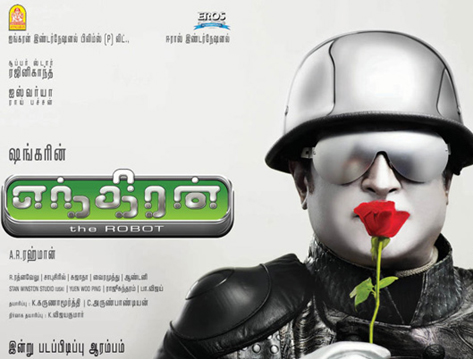Endhiran!

Just as I was hooting and completely enjoying the visual treat that Shankar had cooked up for his clearly defined set of audiences, there was a feminist in me that fought quite hard before losing to Rajni’s charm. I had to let that person out just for the reason that I believe that is my real opinion about Endhiran. I am going to ‘kick start’ my blog with a post in Endhiran – the Robot!
I’ll leave the story line and the graphics and music and all such important details for the qualified critics to discuss about. My experience in film studies and film criticism does not go as far to be able to comment on the screenplay or the techniques. It stays just as low as the underlying (pun intended) meaning that finds a place steadily in our brains while we were too taken away by the joy of film viewing.
A few points that Endhiran nails down our skull painlessly are structured in bullet points below. (Shite! I was trying so hard not to make it known through my blog that I have an MBA. Bullet points did me in!)
– A woman is submissive to a man!
‘If it is a woman, lie her down and fuck her hard’ is the prime moral of the whole film. Through a relatively short Tamil film, Sana (Aishwarya Rai, in this case) goes through a string of rape attempts, all of which in some way or another seem to be an extension of her own “immoral” or “not-woman-like” activities. Firstly, she upsets a bunch of rogues and they take revenge on her (and the man who saves her – read on) by attempting a rape on her. And then she tempts an innocent man who attempts a rape on her and the story goes on and on.
– A woman is the prime cause of all problems!
The film revolves around a robot that falls in love with a woman and thus destroys the world to get her. Irrespective of every other incident, the Robot falls in love when it (he) was kissed by a woman. Had she not kissed the Robot, there would have been no problems. Historically, all Tamil films have been drilling this very concept in our heads. In no particular order (actually in the order of importance), alcohol, cigarettes and women are the three main problems in a man’s life. Because alcohol and cigarettes have no lives and no boobs, they can not dance in front of a man and cause any damage. Women on the other hand have boobs and thus cause all trouble. One other example is the scene where she makes Kalaabavan Mani her ‘one day’ boyfriend. It also reinstates the fact that women invite trouble and men are all saints unless provoked.
– Women have no brains, just boobs!
Just as Vasigaran was a Doctor and Post Doctor and Post Post Doctor with Carnegie Mellon and all over the place, Sana needs a Robot to tell her answers to questions from Ninth Standard Biology exam (which she studies in her MBBS, by the way). This incident in the film is also symbolic of women using men and throwing them away, if we read a little into the trends of Tamil cinema interpretation. She does the same to the once saint Kalaabavan Mani I spoke of a moment earlier.
– A man is a necessity in a woman’s life!
Aishwarya Rai plays with beautiful grace the role of a damsel in distress. As much as I tried arguing with myself that she sought the support of a Robot and not a man, it made no difference to the theory. If a woman is getting raped, no one can do anything but a man (in this case a Robot, who in the end manages to be capable to impregnating her). Thus, a woman needs to be protected and a man alone can do it.
– A woman can not (and should not) think beyond “home”
While Vasigaran wants to use his robotic invention to save the Indian soldiers from dying a meagre death, Sana wants him to draw Mehandi and do her dishes. In a very manly gesture, the Robot ‘saves’ her chastity (and even virginity, considering it’s a Rajnikanth film). But the prime duties of the Robot while with her is to cook special meals, clean up her room, study her subjects and repeat them to her (in more ways than one). Thus, women are selfish and that is how they ought to be.
– Woman is a product for consumption
I can write a thesis just on this theory. Everybody from MGR to Simbu and Dhanush have a tendency to treat women like they are products that are consumed for pleasure and other such reasons. This film, probably because Aishwarya Rai refused to be treated so, uses subtle hints only to get the points across. In Kilimanjaro, the lyrics tactfully written by Pa. Vijay, there is a line that goes “Naan oora vaitha kani. Yennai mella aara vaithu kadi.” Verbatim, it means, I am a soaked fruit, dry me and bite. When I said consumption, I didn’t expect it to turn out so literally! The song pretty much is her plea to be eaten by him and his reiteration that he is the “consumer”.
– Clearly, a woman is a pointless existence
In the pretext of showing Aishwarya Rai as powerful, Shankar has cause immense insult to womanhood. It doesn’t bother me so much because, it is a Rajnikanth film for crying out loud. What else did I expect?
Leave a Reply